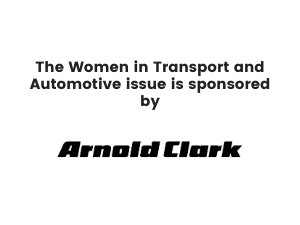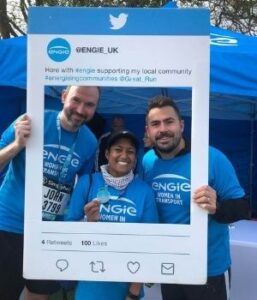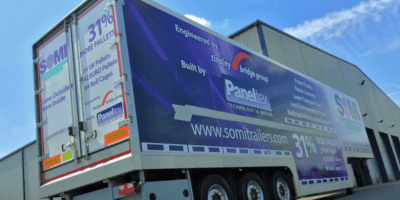Sonya Byers is chief executive of Women in Transport, a not-for-profit network which supports the professional development of women working in transport. Sonya has been a member of Women in Transport for 12 years and a board member for seven years, initially acting as events chair and then vice president as a volunteer. She co-designed and manages the Advance mentoring programme for Women in Transport.

“Looking at the general trends, there is a potential that the number of women working transport declines – women are more likely to be furloughed or are at greater risk of redundancy. We may also see the gender pay gap widen with the attendant ramifications for financial security and female poverty.”
Skills and capabilities are more important than job titles
I have a double degree in European business from the University of Portsmouth and the École Supérieure de Commerce in Bordeaux.
I split my four years at university with alternating semesters studying and working in France and England. It was a fantastic experience with eight house moves in those four years (something that taught me to travel light!) and I graduated with both an English BA (Hons) and a French diploma.
From there I started working in transport quite by chance. I joined a traffic survey team on a zero hours contract to earn some money while I was job hunting. It turned into an almost 20 year career in transport which I never could have imagined (gosh, that makes me feel old!).
My career since then has been so varied and certainly not linear! I’ve worked in transport planning, project management, business development, bids, marketing and client management roles in engineering, business services, accountancy, recruitment and diversity and inclusion.
I love a challenge and feeling like I am contributing and making a difference. I have been incredibly lucky to have hiring managers that have considered my skills and capabilities rather than the job titles I have had.
In 2019, I established my own consultancy and now I work part-time for Women in Transport as chief executive and do ad-hoc management consultancy projects. (You can read more about my journey in the last Womanthology piece I wrote back in 2018.)
How it started…
I joined Women in Transport as a member in 2008 to grow my professional network and to access the development workshops.
I became a volunteer in 2013 after being referred by a friend to one of the board members. It is the best professional decision I have ever made and has provided countless opportunities, experiences and connections that would never have happened without the network.
Supporting women working in transport
Women in Transport is a not-for-profit professional membership network that empowers women working in transport to maximise their potential. Our industry wide network is open and inclusive, representing more than 160 different organisations and over 300 different roles across transport (8% men).
In June 2020, we marked 15 years of advancing women in transport. In the last year, we have reached almost a million people through our social media channels and run a record 33 events.
We have supported cross sector campaigns and research including the Year of Diversity in Transport and Logistics, The Duck Project, Gender Balance in Major Projects and Transport for London’s (TfL) Cycle your City.
We are also supporting an initiative led by the Department of Transport to bring together industry to look at the barriers preventing women from joining and progressing in the sector.
As chief executive, I am responsible for the strategic direction of Women in Transport, overseeing operations and partnerships, generating sponsorship, marketing, delivering our mentoring programme with Angela Gainsford and co-chairing our Women in Transport: Bus group with Chloe Leach O’Connell. I also represent Women in Transport on the Intelligent Transport and Highways UK advisory boards.
Complex impact of COVID-19
Women make up 47% of the UK workforce yet remain significantly underrepresented in the transport sector, accounting for only 18% of the workforce according to latest figures from the Department of Transport. This has sadly declined from the 2017 Eurostat Labour Force Survey figure of 20.95%.
The impact of COVID-19 is a complex one since women working in transport cover a diverse range of skills, job roles and disciplines at every level of various organisations. Also, each person has their own unique experiences and circumstances so assessing and understanding the impact on individuals is incredibly challenging.
Whilst not specific to transport, there is a growing body of evidence and data on the impact of COVID-19 on gender balance. Looking at the general trends, there is a potential that the number of women working transport declines; women are more likely to be furloughed or are at greater risk of redundancy. We may also see the gender pay gap widen with the attendant ramifications for financial security and female poverty.
Data from Institute of Fiscal Studies also highlights that in lockdown, mothers in two-parent households are only doing, on average, a third of the uninterrupted paid-work hours of fathers. Before lockdown, mothers did around 60% of the uninterrupted work hours of fathers. This could cause lasting harm to their careers as we emerge from lockdown.
Unsurprisingly, the survey also revealed the extent to which mothers have picked up the bulk of the time spent on new responsibilities for childcare and housework: they are looking after children during an average of 10.3 hours of the day (2.3 hours more than fathers), and are doing housework during 1.7 more hours than fathers.
The data does show that fathers are now taking on a greater share of household responsibilities than they were before the crisis. It’s important to look at how businesses can enable a greater balance of shared parental responsibility to enable mothers to fully participate in paid work. The crisis has certainly highlighted the importance of the unpaid care work undertaken (predominately) by women and grandparents that enables the economy to function.
On the positive side, we have seen companies that were previously set against home and flexible working forced to become more agile and enable different and new ways of working. This provides an opportunity as we know that flexible working is a significant enabler when it comes to the recruitment, retention and progression of women in the workforce.
As employers and policy makers navigate through this uncertain and challenging time, it is important to consider the diverse needs of individuals. Data and equality impact assessments are going to be essential to ensure that gender balance, and inclusivity more generally, continue to progress in a positive direction.
Reacting quickly to support our members
During COVID-19 we have introduced virtual events, increased our communications, started a newsletter and host regular, informal networking sessions via Zoom to support our members.
In April 2020, we joined forces with WISE and 20 other organisations to issue a joint statement on keeping gender on the agenda during COVID-19 and beyond and set up a portal of pooled resources to support women and girls in STEM.
I must give a huge commendation to Christine Hurley, our executive support at Women in Transport. She has always been a consummate professional and is dedicated and passionate about delivering a great experience for our members. The pandemic completely changed our events programme (which was planned more than six months in advance and was all in-person events). Christine had to adapt very quickly and learn a host of new platforms. She is simply brilliant and incredibly humble.
Liaising with the Government
Women in Transport worked with MPs from across the political spectrum to form the All Party Parliamentary Group (APPG) for Women in Transport in 2016. Chaired by Ruth Cadbury MP, the group provides a forum to discuss and overcome the under-representation of women in the transport industry by promoting best practice examples of employers leading the way in gender diversifying their workforce.
Our plan for this year is to publish a policy paper highlighting best practice and providing a snapshot of what it is like to be a woman in the transport industry in the UK. As part of the research, we will look at how the pandemic has affected women working in the sector. We will also gain women’s views about their role in the recovery.
Our Advance mentoring programme
Our work at Women in Transport also includes continuing the legacy of the 100 Years of Women in Transport campaign and one of the key initiatives is providing opportunities for personal development and career progression at all levels.
Our Advance mentoring programme offers structured, professional mentoring for women working in transport. Launched in 2017, the programme is now in its third year and has supported 160 mentees and mentors to date.
The programme was designed and is delivered by myself and Angela Gainsford, a long-standing member of Women in Transport. In 2020, Steve Griffiths joined the delivery team as a volunteer to support mentor engagement. Mentees and mentors are invited to apply through an online form in October within a two-week application window. Successful applicants are provided with training.
The commitment is six, one-hour sessions over the course of nine months (January to September). Each pair is provided with a mentoring agreement to help structure and review their relationship. Feedback is captured during the programme and ongoing support and networking is provided for mentees and mentors.
Advance is entirely funded through corporate sponsorship and offered at no additional cost to our members. The programme is open to any woman working in transport who is a member of Women in Transport, in any discipline and at any stage of their career. Mentors are a diverse cohort of manager level or above, working in transport (women and men).
We are delighted to be launching a fourth year for 2021 with sponsorship from TXM Recruit, Xanta Rail and Network for Skills. The support of our corporate sponsors allows us to deliver a programme that is inclusive and accessible. TXM Recruit and Xanta Rail have been sponsors of the programme since the pilot year and their continued support in these challenging times is invaluable.
Catching up
I have just returned from 11 weeks maternity leave so first up is a bit of catching up and reconnecting. Next up is launching applications for Advance 2021 on 1 October then selecting our cohort of mentors and mentees and providing training in November.
I am also working closely with Christine, the board, our volunteers and partners on how we secure a sustainable future for Women in Transport. We are reviewing our strategy and operating model in the coming months and have some exciting projects and partnerships in the pipeline so watch this space…
https://twitter.com/veerasamy_sonya
https://www.linkedin.com/in/sonyabyers/
https://www.womenintransport.com/
https://twitter.com/transportwm
https://www.instagram.com/transportwmn/










